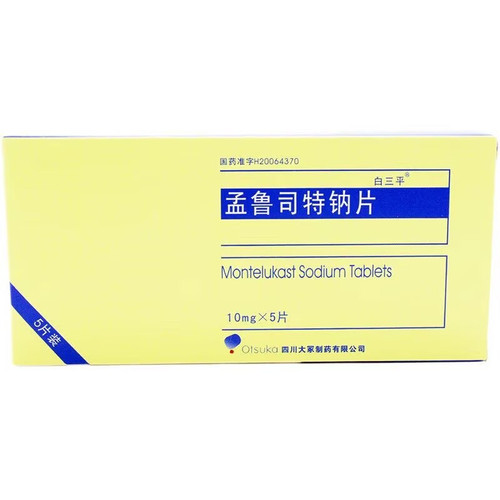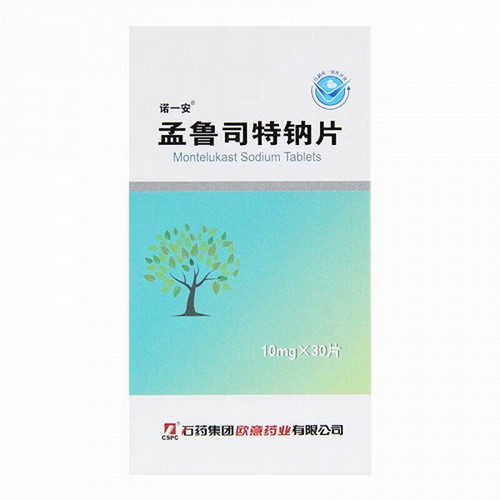Product Overview
[Drug Name]
Generic Name: Montelukast Sodium Tablets
Trade Name: ShuNingAn Montelukast Sodium Tablets 10mg*5 Tablets
Pinyin Code: ShuNingAn MengLuSiTeNaPian 10mg*5 Tablets
[Main Ingredient]
Montelukast sodium.
[Properties]
This product is a yellow, round, film-coated tablet.
[Indications/Main Functions]
It is indicated for the prevention and long-term treatment of asthma in adults aged 15 years and older, including prevention of daytime and nighttime asthma symptoms, treatment of aspirin-sensitive asthma, and prevention of exercise-induced bronchoconstriction. This product is indicated for the relief of symptoms associated with allergic rhinitis (seasonal and perennial allergic rhinitis in adults aged 15 years and older).
[Specifications]
10mg*5 tablets
[Dosage and Administration]
One tablet (10mg) once daily. Asthma patients should take the tablet at bedtime. Allergic rhinitis patients may take the tablet as needed based on their individual needs. Patients with both asthma and seasonal allergic rhinitis should take the medication once nightly. Adults 15 years of age and older with asthma and/or allergic rhinitis should take one tablet (10 mg) once daily. It is generally recommended that treatment efficacy be assessed based on asthma control indicators, with the effectiveness of this medication being apparent within one day of initiation. This medication can be taken with or without food. Patients should be advised to continue taking this medication, regardless of whether their asthma is under control or exacerbated.
[Adverse Reactions]
This medication is generally well tolerated, with mild adverse reactions that generally do not require discontinuation of treatment. The overall incidence of adverse reactions with this medication is similar to that with placebo. For patients aged 15 years and older with asthma: Montelukast sodium tablets have been evaluated in clinical studies in approximately 2,600 adult patients aged 15 years and older with asthma. In two similarly designed, placebo-controlled, 12-week clinical trials, abdominal pain and headache were reported as drug-related adverse events at a higher rate than placebo in the montelukast sodium group (≥1%). However, the incidence of these adverse events was not significantly different between the two groups. In clinical studies, a total of 544 patients have been treated with this product for at least 6 months, 253 patients have been treated for 1 year, and 21 patients have been treated for 2 years. The incidence of adverse events has not changed with the extension of the treatment time of this product. Seasonal allergic rhinitis patients aged 15 years and above: Clinical studies have been conducted in 2199 adults aged 15 years and above with seasonal allergic rhinitis to evaluate the safety of this product. This product is well tolerated when taken once a day in the morning or at night, and the incidence of adverse reactions is similar to that of placebo. In placebo-controlled clinical studies, the incidence of adverse events in the treatment group of this product was less than 1%, and no drug-related adverse events with an incidence higher than that of the placebo group were found. In the 4-week placebo-controlled clinical trial, the safety profile was consistent with the 2-week clinical trial. In all clinical studies, the incidence of drowsiness was similar to that of the placebo group. The following adverse reactions have been reported post-marketing with this drug: hypersensitivity reactions (including anaphylaxis, angioedema, rash, pruritus, urticaria, and rarely, hepatic eosinophilic infiltration); abnormal dreams and hallucinations; somnolence; excitement; irritability, including aggressive behavior; restlessness; insomnia; paresthesia/tactile disturbances; and, more rarely, seizures; nausea, vomiting, dyspepsia, diarrhea; elevated ALT and AST; and, rarely, cholestatic hepatitis; arthralgia, including myalgia with muscle cramps; increased bleeding tendency; bruising; palpitations; and edema.
[Precautions]
The efficacy of this drug for the oral treatment of acute asthma attacks has not been established. Therefore, it should not be used for the treatment of acute asthma attacks. Although the dose of concomitant inhaled corticosteroids can be gradually reduced under the guidance of a physician, montelukast sodium tablets should not abruptly replace inhaled or oral corticosteroids. Rarely, patients receiving antiasthma medications, including leukotriene receptor antagonists, have experienced one or more of the following when their systemic corticosteroid dose is reduced: eosinophilia, vascular rash, worsening pulmonary symptoms, cardiac complications, and/or neuropathy (sometimes diagnosed as Churg-Strauss syndrome, a systemic eosinophilic vasculitis). Although a causal relationship to leukotriene receptor antagonists has not been established for these conditions, caution and appropriate clinical monitoring are recommended when reducing the systemic corticosteroid dose in patients receiving this medication.
[Geriatric Use]
No dose adjustment is required for elderly patients, patients with renal insufficiency, patients with mild to moderate hepatic impairment, or patients of different sexes.
[Overdose]
No specific data are available regarding overdose with this medication in clinical practice. In studies for the treatment of chronic asthma, adult patients have received doses up to 200 mg daily for 22 weeks and in short-term studies up to 900 mg daily for approximately one week without clinically significant adverse events. There have been reports of acute overdose postmarketing and in clinical studies with this product. These include reports in adults and children using doses up to 1000 mg. Clinical and laboratory findings consistently demonstrate safety in both adults and children, with no adverse events reported in the majority of overdose reports. The most common adverse events were consistent with the safety profile and included abdominal pain, somnolence, thirst, headache, vomiting, and hyperactivity. It is unknown whether montelukast sodium tablets are cleared by peritoneal or hemodialysis.
[Pharmacology and Toxicology]
Cysteinyl leukotrienes (LTC4, LTD4, LTE4) are potent inflammatory mediators released by various cells, including mast cells and eosinophils. These important pro-asthma mediators bind to cysteinyl leukotriene (CysLT) receptors. Type I cysteinyl leukotriene (CysLT1) receptors are located in the airways (including airway smooth muscle cells and airway macrophages) and other pro-inflammatory cells (including eosinophils and certain bone marrow stem cells). CysLTs are implicated in the pathophysiology of asthma and allergic rhinitis. In asthma, leukotriene-mediated effects include a range of airway responses, such as bronchoconstriction, mucus secretion, increased vascular permeability, and eosinophil accumulation. In allergic rhinitis, CysLTs are released from the nasal mucosa during both the immediate and delayed phases following allergen exposure, and these CysLTs are associated with allergic rhinitis symptoms. Intranasal CysLT provocation increases nasal airway resistance and symptoms of nasal obstruction.






